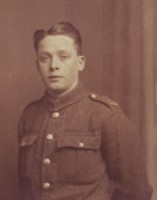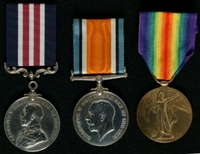

(L to R) Military Medal; British War Medal; Allied Victory Medal
William was born on the 14th April 1894 in Oldham, Lancashire. His father was called Edward and his mother was Sarah. He had an older brother called Fred and at least 8 younger siblings. They were Alice, James, Joseph, Milly, Annie, Elizabeth, Miriam and Betsy. Fred's medals are also in the Museum of the Manchester Regiment collection.
Edward worked as a moulder in an iron foundry. In 1901 the family lived at 11 Swinton Street in the Clarksfield area of Oldham. Ten years later they had moved the short distance to 35 Brewerton Road. Both of these houses were small terraces, and must have been extremely cramped as the family grew. In 1911 William worked as a spindle setter for Platt Brothers and Company. This company made textile machinery and supplied Oldham's many cotton mills.
The family were Methodists, and both Fred and William were staunchly religious. They attended the United Methodist Church on Roundthorn Road, and both brothers taught at the Sunday School there.
The First World War broke out in August 1914 and hundreds of thousands of men joined the Army within a few months. Neither Fred nor William enlisted with them. Their Methodist beliefs meant that they were both pacifists, opposed to war.
William eventually joined the Army on the 17th February 1916. Conscription had been introduced at the beginning of the year, although we know William wanted to serve and believe he volunteered. He joined the 10th Battalion of the Manchester Regiment. This was a unit of the Territorial Force based in Oldham. The original 10th Battalion had been sent overseas in 1914, so new recruits such as William were assigned to the second 10th Battalion (2/10th). This was training in Colchester, Essex when William enlisted.
Although he had been willing to enlist and serve his country, William's beliefs would not let him take up arms. Instead he volunteered to become a stretcher bearer. His job would now be to find and evacuate wounded soldiers from the battlefield so that they could receive medical care.
In around March 1917 soldiers serving in units of the Territorial Force were given new service numbers. William's became 376848. We don't know his old number. At around the same time the 2/10th Battalion was sent to France.
The battalion served around Bray during the summer of 1917, before moving north to Ypres in Belgium during late August. They guarded the North Sea coast at Nieuwpoort whilst the Passchendaele Offensive began around Ypres. They joined this offensive on the 9th October when they attacked Poelcapelle.
This attack took place in appalling conditions. Constant rain and shelling had turned the ground into a sea of mud that was impossible to advance over. German machine guns and shells constantly killed and wounded men, and meant no supplies could be brought up. The battalion was not relieved until the night of the 11th-12th.
We believe it was around this time that William was awarded the Military Medal. His award was published in the London Gazette on the 14th January 1918. Although there was no citation with the award to tell us what he did, an article in the Oldham Evening Chronicle newspaper on the 24th November 1917 tells us it was for 'carrying wounded in under heavy shell fire'.
This was the largest battle the 2/10th Battalion fought. They returned to the front lines in December 1917 and January 1918 for quieter periods of trench-holding. In February 1918 the battalion was disbanded. This happened because of a reorganisation of the Army that aimed to have more soldiers in fewer battalions, rather than fewer soldiers in more battalions.
Members of the 2/10th Battalion were sent to the 1/10th, the 1/7th or the 1/8th Battalion of the Manchester Regiment. We don't know which unit William joined. All 3 of these units fought together during the desperate fighting against the German Spring Offensive during March and April 1918. After this had been defeated the Allies began their own offensive on the 8th August. This was soon pushing the Germans back.
Around the 25th August William was taking part in the British attack on the village of Miraumont, on the River Ancre. This was an important position for the Germans and they defended it bravely, but unsuccessfully. We believe it was during this attack that William was badly wounded. He was hit by shrapnel in the left eye, the chest and both legs. On the 27th he sent a Field Service Postcard home. These could not be written on, but contained a number of different options that could be deleted as appropriate. William's message read:
I have been admitted into hospital / wounded / and am going on well. / Letter follows at first opportunity.
A notice appeared in the Oldham Evening Chronicle on the 21st September stating that William 'is in hospital in Boulogne, progressing favourably'.
In fact, although William survived his injuries, he never recovered enough to return to duty. He was discharged as 'no longer physically fit for war service' on the 25th February 1919 and awarded a Silver War Badge with serial number B140928 to show that his discharge was honourable.
William lost the sight in his left eye, and walked with a heavy limp for the rest of his life. He suffered a great deal for many years due to shrapnel that had not been removed from his body after he was wounded. It was not until 1940 that one piece was removed from his back. This operation went well, and William was 'much better' afterwards.
After his discharge William returned to Oldham. He married Annie Usher in nearby Ashton-under-Lyne between July and September 1923. They had one son, Harold, between April and June 1924.
William returned to Platt Brothers and worked there for many years. Around the time the Second World War broke out in September 1939 he moved to the Avro factory in Chadderton, where he worked as a stores auditor.
Both brothers lived near each other for many years. William lived on Melling Road, just round the corner from Fred at 36 Fulham Street. They both returned to Roundthorn Methodist Church, and William became the organist and choirmaster. He continued as organist for the rest of his life.
William's grandson Paul was a keen footballer during the 1970's and played both Saturday and Sundays. Paul remembers that William would watch him play every week, whatever the weather, despite him being in his eighties. Even on the sidelines of a football pitch, he would always be 'immaculately dressed'. He believed that the state of someone's shoes said a great deal about a person, and made sure that his were always well-polished.
Like many veterans, William never told his family about his wartime experiences.
Fred died on the 15th February 1977, aged 84. William died just a few months later on the 26th December, after a short illness. He was 83 years old.
Fred had served in the 24th Battalion of the Manchester Regiment as a stretcher bearer. He reached the rank of Corporal and was awarded the Military Medal with 2 Bars. He was one of only 185 men to be awarded 2 Bars during the First World War, and awards of the medal to brothers must be even rarer. Both Fred and William's medals were donated to the Museum of the Manchester Regiment in January 1994.




